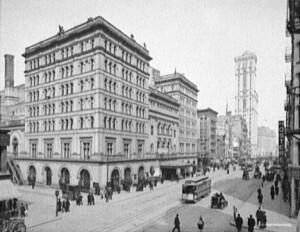Metropolitan Opera House
Barely a week after the Triangle fire, a meeting was held at the Metropolitan Opera House to memorialize the victims. The crowd was galvanized when organizer and former garment worker Rose Schneiderman stepped onto the stage. A 29-year-old Jewish immigrant, she demanded accountability and called for a strong working-class movement. Her powerful speech would influence reform efforts for decades to come.
Frances Perkins, F.D.R’s future Secretary of Labor remembered that in the days following the fire, there was a need to turn the tragedy “into some kind of victory, [take] some kind of constructive action.” The Women’s Trade Union League (WTUL) sponsored one of the largest post-fire meetings on April 2, 1911.
With a mixed audience of garment workers and middle-class reformers, the upper galleries of the Opera House were filled with Lower East Siders, and the orchestra with women “trailing furs and feathers.”
Speakers talked about reform efforts in the wake of the Triangle tragedy. Middle-class progressives advocated for a Bureau of Fire Prevention; the workers were unenthusiastic since such committees rarely involved anyone from the unions.
As the two groups continued to disagree, emotions ran high. WTUL organizer and former garment worker, Rose Schneiderman, a petite red head known for her oratory skills, began to speak. She told the crowd of 3,500:
“I would be a traitor to those poor burned bodies, if I were to come here to talk good fellowship. We have tried you good people of the public and we have found you wanting... This is not the first time girls have been burned alive in this city. Every week I must learn of the untimely death of one of my sister workers. Every year thousands of us are maimed. The life of men and women is so cheap, and property is so sacred! There are so many of us for one job, it matters little if one hundred and forty-odd are burned to death. We have tried you citizens! ... I can’t talk fellowship to you who are gathered here, too much blood has been spilled. I know from experience it is up to the working people to save themselves. And the only way is through a strong working-class movement.”
Many years later Frances Perkins recalled that this was the first time she had ever heard Rose Schneiderman speak.She described “a very small [woman with] red hair, fiery red hair, and blazing eyes and pretty too… she made a remarkable speech which really stirred people.”
Over the next decades, Schneiderman would act on her frustration with the “good people” who spoke of reform but tolerated a system which exploited labor. She would help make New York State’s fire and workplace safety legislation a model, and through her friendship with Eleanor and Franklin Roosevelt, in time she would influence the federal government’s policies, too.



